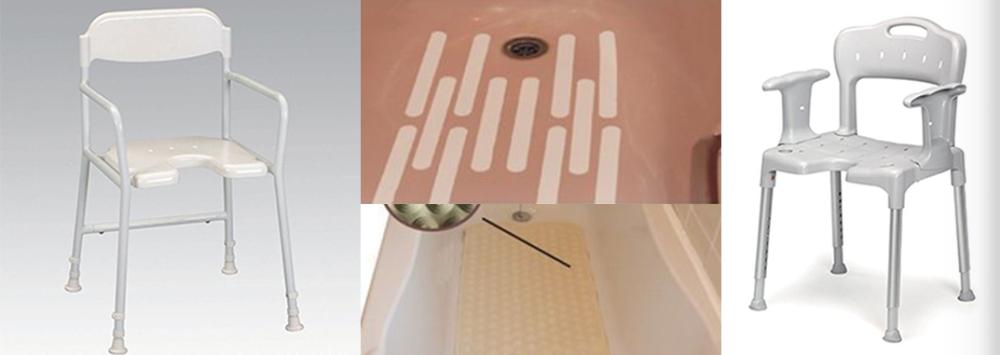
Taking the Risk out of Personal Hygiene
Sally Madeley-Carr, OT24 Nov 2021
A bathroom is a more risky place for the elderly than younger people.
Pensioners usually have a less sturdy body than younger people and age also brings with it other conditions and disabilities which make everyday tasks a little more challenging.
Health changes which can affect safety in the bathroom include balance, mobility, dexterity, strength, grip, arthritis (e.g. joint pain), vision, mental health (e.g. Alzheimer's, dementia and memory loss) and general weakness which may accompany illness.
Risk factors in play in a bathroom can include hot water, spilt water, poor lighting and obstacles.
A little thought needs to go into the current working of a bathroom and the changes which need to be made to make it more 'elderly friendly'.
A more' elderly friendly' bathroom helps the individual retain their self-esteem and confidence. Such peace of mind promotes calm and can therefore reduce accidents.
Balance
A weakened balance system can be as a result of illness or disability and can make straightforward tasks need more thought and planning.
An aid to balance can be no more than a walking stick, giving the individual something to rest on when moving.
A walking frame allows the user to place some weight on the frame, whilst taking small steps forward. The user lifts the frame into a forward position and then steps towards the frame, before moving the frame forward again.
A walking frame with wheels allows the user to push the walker forward and may also have brakes to accommodate stopping and parking up e.g. when used outside and standing to chat for a while, or waiting in a queue at a checkout.
Walkers are height adjustable and it is important to get the height perfect for the user, so as to avoid hunching, or avoid the walker with wheels running away from the user and causing a fall.
Taking steps forward can feel rather nerve-wracking and so grab rails at appropriate points around the bathroom (e.g. entering the bathroom, moving towards the wash hand basin, toilet, or bath / shower) can empower the user to move, stand and function more safely.
Grab rails within a bath or shower give confidence to the person, when entering and leaving the bathroom, as well as supporting standing whilst bathing.
Non-slip bath mats in the bath / shower are a must for us all. Whilst water can cause us to slip, spilt bath gel and shampoo can exacerbate the problem.
Having a non-slip mat outside the bathing area is also a must, as it allows the person with balance difficulties to establish a safe footing when stepping out of the bathing area.
Mobility
A walking frame is equally as useful to a person with mobility issues but other individuals who have more serious difficulties may need to make use of a wheelchair to enter and leave a bathroom.
To allow a wheelchair to access a bathroom, the doorframe may prove too narrow to accommodate entry. For moving around the bathroom, a shower chair with wheels could prove the answer.
- Bath
To safely enter a bath, the individual with mobility issues can make use of a bath board. Fixed to the depth of the bath itself, the user sits on the bath board and then shuffles along with upper arm body strength until he / she is able to lower oneself down into the water. Grab rails fitted to the bath board and to the wall will help with getting in and out of the bath.
A bathroom chair allows the user to feel well supported and removes the need to lower oneself into the bath. The comfort of the bath chair can also be enjoyed for those who use a shower over a bath.
A bath chair comes as a seat but other models can include a seat back for more support and also seat arms to make the user feel safer and more comfortable.
For the user who may have difficulty stepping into the bath, a swivel bath chair will take the worry out of injuring oneself.
- Shower v Wet Room
A shower comes with a shower tray, a small lip (around four inches (4 cm) which needs to be stepped over to get into the shower.
For a wheelchair user, or for the person who will feel more confident and independent in a shower chair (with or without wheels), a wet room is on ground level and so allows the user to either walk in, or ride into, the shower area, without having to address the 'small lip' hazard.
- Bath Mats and Shower Mats
To stand in a bath or shower, or to stand up from a sitting bathing position, anti-slip bath mats are a priority. Without a bath mat, water and, more so, water mixed with bathing gel or shampoo, can cause one to lose one's balance and to fall and maybe injure oneself on the way down.
Choose a bath / shower mat which :
- has a textured surface and so allows the user to be able to steady one's feet
- is easily cleanable - a toothbrush may come in handy for deep cleaning
- has anti-bacterial qualities, to reduce the build up of mould and mildew.
- has drain holes built into it, to allow it to dry quickly.
Also make sure that the floor mat to step out of the bathing area onto also has an anti-slip underside.
- Floor tiles
Floor tiles come in many finishes. Avoid shiny tiles which will promote slipping.
Stone tiles actually absorb small spillages and are therefore much safer to stand on than the shiny versions.
Dexterity, Strength and Grip
Joint pain, arthritis, certain illnesses and even old age itself can cause a lack of strength and a weakness of grip.
- Turning Taps On and Off
Whilst a traditional tap needs strength and good grip to turn the tap itself, lever taps prove better for people with reduced dexterity. Many other designs of tap are available, including push button taps and infrared / sensor designs.
- Opening and Squeezing Toiletry bottles
Bath gel and shampoo bottles can sometimes need two hands to release the liquids inside and so, for the person who needs to hold onto a grab rail to secure one's safety, wall-mounted toiletry bottles which need only one hand to release the contents will prove a better option.
- Using the Toilet
A standard toilet tends to be 17 inches (42.5 cms.) in height but, for elderly people who find sitting down and standing back up a little difficult, a toilet of 20 inches (50 cms.) and 21 inches (52.5 cms.) makes using the toilet more comfortable and safer.
Added height can be given to a standard toilet by simply purchasing an extra thick toilet seat, which gives enough extra height to make sitting and standing prove more comfortable tasks.
Some designs of shower seat fit comfortably around a toilet bowl and come with a hole cut out of the centre of the seat, allowing for toileting to be done from there.
Reduced Vision
For a person with changing sight, a bathroom needs to be ergonomically friendly.
Avoid clutter, avoid sharp edges on bathroom units and use colour coding to make items easily recognisable e.g. cream walls, orange towels and brown cupboards.
Make use of directional lighting (e.g. spotlights), to highlight the most important areas in the bathroom e.g. the toilet, wash hand basin and bathing area. Poor lighting casts shadows and can cause unnecessary accidents.
Use warm lighting, rather than bright lighting, in a bathroom, as bright lights and the accompanying glare can add to vision difficulty.
Mental Health
Forgetfulness (Alzheimer's and dementia) and short-term memory loss can make simple tasks become dangerous e.g. forgetting to switch a tap off, allowing water temperature to become too hot or too cold.
Depending on your needs, consider purchasing sensor taps which can switch off automatically when not in use.
For safety against burning and scalding, fit a thermostatic mixer valve, which can supply the free flow of water at the desired temperature.
General Weakness
Illnesses such as flu and other fevers can weaken the body and blur vision. Having grab rails to hold onto and good lighting can reduce the likelihood of slipping or falling.
Summary
Where there's water, there's an element of danger. A wet floor in a bathroom can create problems for all but maybe more so for elderly people.
When purchasing a bath chair, be sure to take the measurements of your bath first, so as to allow you to choose a bath chair model which will fit your personal bath size and design.
Directional spotlights in the bathroom can prevent accidents.
Bright lights and the accompanying glare can irritate eyesight and so reduce vision clarity.
Bath mats, both inside the bathing area and out, are so important to us all, as they prevent slipping and can reduce accidents and injuries.
Keep a tidy bathroom and avoid sharp edges on bathroom units, both of which will add to the positive bathing experience.

Sally Madeley-Carr, OT
Sally qualified as an Occupational Therapist in 1996 and is a well-respected professional in the field of rehabilitation equipment and living aids. She has worked in private practice and within the NHS, developing a broad experience with adults and children. Click here for Sally's registration with the Health and Care Professions Council. The HCPC regulates health, psychological and social work professionals in the UK.